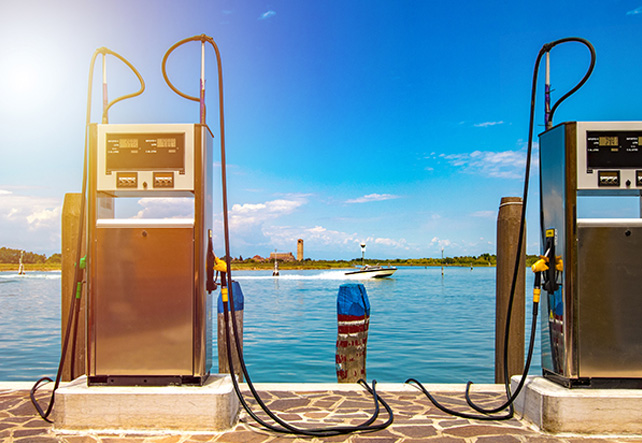
How a Commercial Fleet Management System Can Save You Money
January 4, 2024
How Anti-Gel Additives Keep Diesel Flowing Smoothly
January 17, 2024Marinas are bustling hubs of maritime activity, serving as gateways to the open water and offering a variety of services to boat owners and enthusiasts. Among these services, one of the most critical is the provision of fuel. Fuel tanks play a pivotal role in marina operations, ensuring that vessels have access to the fuel they need for safe and enjoyable journeys on the water. In this article, we will explore the significance of fuel tank maintenance in marina operations and outline best practices for their maintenance to ensure a seamless boating experience for all.
The Importance of Fuel Tanks in Marina Operations
1. Fuel Accessibility
Fuel tanks are the lifelines of marinas, providing the essential energy source that keeps boats running. Whether it’s recreational boaters seeking a weekend adventure or commercial vessels engaged in various maritime activities, easy access to fuel is critical. Marine Fuel tanks located strategically within marinas ensure that boaters can conveniently refuel before and after their journeys.
2. Revenue Generation
Beyond facilitating marine activities, fuel sales are often a significant source of revenue for marinas. Many marinas rely on fuel sales to offset operating costs and invest in improvements and maintenance. This makes the proper management and maintenance of marine fuel tanks not only essential for boaters but also for the financial sustainability of marinas.
3. Environmental Responsibility
Fuel tank maintenance in marinas also plays a vital role in promoting environmental responsibility. Modern fuel tanks are equipped with advanced features to prevent spills and leaks, reducing the risk of pollution in sensitive aquatic ecosystems. Properly maintained tanks contribute to preserving the natural beauty and ecological health of the waters surrounding marinas.

Best Practices for Fuel Tank Maintenance
Now that we understand the importance of fuel tanks in marina operations, it’s crucial to explore best practices for their maintenance. Proper maintenance not only ensures a consistent fuel supply but also safeguards the environment and the reputation of the marina.
1. Regular Inspections
Regular inspections of fuel tanks are the cornerstone of their maintenance. These inspections should cover various aspects, including tank integrity, fuel quality, and safety features. Inspect tanks for signs of corrosion, leaks, or structural issues. Additionally, check for water or contaminants in the fuel, which can harm engines and lead to customer dissatisfaction.
2. Scheduled Cleaning
Fuel tanks should be periodically cleaned to remove accumulated sediment and impurities. Contaminants in the tanks can compromise fuel quality and damage engines. Cleaning schedules should be based on usage patterns and the specific needs of each marina.
3. Fuel Quality Monitoring
Implement a system for monitoring the quality of the fuel stored in tanks. Regularly test fuel samples to ensure they meet industry standards for cleanliness and octane ratings. This practice not only preserves engine performance but also helps maintain customer trust.
4. Leak Detection Systems
Invest in reliable leak detection systems that can promptly identify and alert marina staff to potential issues. Modern technology can provide real-time monitoring, ensuring quick responses to any emerging problems, thereby preventing costly environmental damage and service interruptions.
5. Compliance with Regulations
Stay abreast of local, state, and federal regulations related to fuel tanks and marina operations. Compliance is not only a legal obligation but also a means of ensuring the safety of both customers and the environment. Failure to meet regulatory standards can result in fines, litigation, and damage to the marina’s reputation.
6. Staff Training
Properly train marina staff in fuel tank maintenance, safety protocols, and emergency response procedures. Knowledgeable staff can quickly identify and address issues, minimizing downtime and safety risks.
7. Emergency Response Plan
Develop a comprehensive emergency response plan in the event of fuel tank-related incidents. This plan should include containment measures, contact information for relevant authorities, and steps to mitigate environmental damage.
8. Environmental Stewardship
Embrace environmentally responsible practices, such as spill containment systems and fuel spill kits. These measures not only demonstrate a commitment to protecting the environment but also reduce the financial and reputational risks associated with accidents.
9. Documentation and Record-Keeping
Maintain thorough records of fuel tank maintenance activities, inspections, and compliance checks. These records can serve as evidence of due diligence in cases of regulatory inquiries or customer concerns.
10. Invest in Modern Tanks
Consider upgrading to modern, double-walled fuel tanks with advanced corrosion-resistant coatings and leak detection systems. While the initial investment may be higher, these tanks offer enhanced safety and longevity, reducing long-term maintenance costs.
Conclusion
Fuel tanks are the unsung heroes of marina operations, ensuring boaters have access to a reliable fuel source while generating crucial revenue for marinas. Proper maintenance of these tanks is essential to sustain a thriving marine ecosystem, preserve natural beauty, and meet regulatory standards.
By implementing best practices for fuel tank maintenance, marinas can not only enhance the boating experience for their customers but also safeguard their financial viability and reputation. With a commitment to regular inspections, fuel quality monitoring, staff training, and environmental stewardship, marinas can continue to play their pivotal role in facilitating safe and enjoyable maritime adventures for all.
Related Tag: commercial fuels solutions



